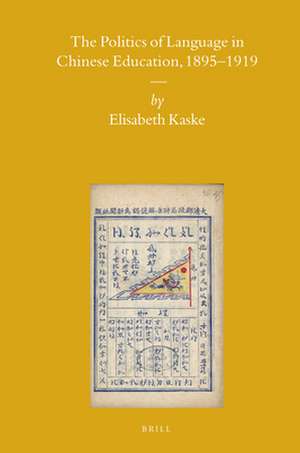The Politics of Language in Chinese Education, 1895–1919: Sinica Leidensia, cartea 82
Autor Elisabeth Kaskeen Limba Engleză Hardback – 26 noi 2007
Din seria Sinica Leidensia
- 18%
 Preț: 1037.13 lei
Preț: 1037.13 lei - 18%
 Preț: 902.42 lei
Preț: 902.42 lei - 18%
 Preț: 713.16 lei
Preț: 713.16 lei - 18%
 Preț: 633.42 lei
Preț: 633.42 lei - 18%
 Preț: 872.96 lei
Preț: 872.96 lei - 18%
 Preț: 622.50 lei
Preț: 622.50 lei - 18%
 Preț: 585.95 lei
Preț: 585.95 lei - 18%
 Preț: 868.32 lei
Preț: 868.32 lei - 18%
 Preț: 685.21 lei
Preț: 685.21 lei - 18%
 Preț: 1358.39 lei
Preț: 1358.39 lei - 18%
 Preț: 717.20 lei
Preț: 717.20 lei - 18%
 Preț: 725.17 lei
Preț: 725.17 lei - 18%
 Preț: 579.19 lei
Preț: 579.19 lei - 18%
 Preț: 596.62 lei
Preț: 596.62 lei - 18%
 Preț: 863.70 lei
Preț: 863.70 lei - 18%
 Preț: 1218.12 lei
Preț: 1218.12 lei - 18%
 Preț: 630.84 lei
Preț: 630.84 lei - 18%
 Preț: 777.25 lei
Preț: 777.25 lei - 18%
 Preț: 601.94 lei
Preț: 601.94 lei - 18%
 Preț: 636.88 lei
Preț: 636.88 lei - 28%
 Preț: 1692.21 lei
Preț: 1692.21 lei - 18%
 Preț: 729.06 lei
Preț: 729.06 lei - 18%
 Preț: 920.41 lei
Preț: 920.41 lei - 18%
 Preț: 1262.84 lei
Preț: 1262.84 lei - 18%
 Preț: 546.41 lei
Preț: 546.41 lei -
 Preț: 329.79 lei
Preț: 329.79 lei - 18%
 Preț: 821.93 lei
Preț: 821.93 lei - 18%
 Preț: 547.56 lei
Preț: 547.56 lei -
 Preț: 336.47 lei
Preț: 336.47 lei - 18%
 Preț: 691.89 lei
Preț: 691.89 lei - 18%
 Preț: 1061.32 lei
Preț: 1061.32 lei - 18%
 Preț: 731.40 lei
Preț: 731.40 lei - 18%
 Preț: 521.30 lei
Preț: 521.30 lei - 18%
 Preț: 823.08 lei
Preț: 823.08 lei - 18%
 Preț: 758.99 lei
Preț: 758.99 lei - 18%
 Preț: 610.43 lei
Preț: 610.43 lei - 18%
 Preț: 578.89 lei
Preț: 578.89 lei - 18%
 Preț: 763.69 lei
Preț: 763.69 lei - 15%
 Preț: 518.15 lei
Preț: 518.15 lei -
 Preț: 262.02 lei
Preț: 262.02 lei - 18%
 Preț: 937.18 lei
Preț: 937.18 lei - 18%
 Preț: 635.15 lei
Preț: 635.15 lei - 18%
 Preț: 585.70 lei
Preț: 585.70 lei - 15%
 Preț: 530.26 lei
Preț: 530.26 lei - 18%
 Preț: 659.86 lei
Preț: 659.86 lei - 15%
 Preț: 525.15 lei
Preț: 525.15 lei - 18%
 Preț: 579.34 lei
Preț: 579.34 lei - 15%
 Preț: 520.24 lei
Preț: 520.24 lei - 18%
 Preț: 536.28 lei
Preț: 536.28 lei - 18%
 Preț: 705.05 lei
Preț: 705.05 lei
Preț: 1020.46 lei
Preț vechi: 1244.47 lei
-18% Nou
Puncte Express: 1531
Preț estimativ în valută:
195.29€ • 212.05$ • 164.04£
195.29€ • 212.05$ • 164.04£
Carte indisponibilă temporar
Doresc să fiu notificat când acest titlu va fi disponibil:
Se trimite...
Preluare comenzi: 021 569.72.76
Specificații
ISBN-13: 9789004163676
ISBN-10: 9004163670
Pagini: 537
Dimensiuni: 155 x 235 x 33 mm
Greutate: 1.02 kg
Editura: Brill
Colecția Brill
Seria Sinica Leidensia
ISBN-10: 9004163670
Pagini: 537
Dimensiuni: 155 x 235 x 33 mm
Greutate: 1.02 kg
Editura: Brill
Colecția Brill
Seria Sinica Leidensia
Public țintă
All those interested in the intellectual and social history of late Qing and early Republican China, press history, education, sociolinguistics.Notă biografică
Elisabeth Kaske, Ph.D. (2006) in Chinese Studies, Heidelberg University, is Junior Professor of Chinese Studies at Frankfurt University. She has published on the history of late Qing China, including Bismarcks Missionäre: Deutsche Militärinstrukteure in China 1884–1890 (Wiesbaden 2002).
Recenzii
"This volume will be most valuable as a reference volume for linguists and cultural historians. The extensive appendices of newspapers, press runs, circulation and editorial stance offer valuable chronicles of modern journalism. Scholars of language and script reform will find useful perspectives on how even the most popular reforms attract multiple and contradictory antagonists and innovators."
Mary S. Erbaugh, The China Quarterly, 199, September 2009.
Mary S. Erbaugh, The China Quarterly, 199, September 2009.
